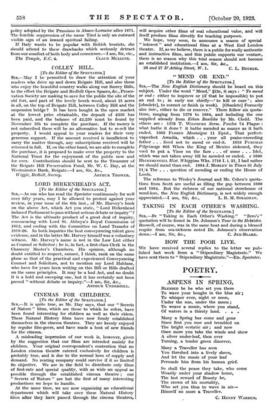" MEND OR END."
[To the Editor of the SPECTATOR.] SIR,—The New English Dictionary should be heard on this subject. Under the word " Mend," §12c, it says : " To mend or end : either to improve or (if that be impossible) to put an end to ; in early use chiefly—' to kill or cure ; also [obsolete], to correct or finish (a work). [Obsolete] Formerly also intr., either to die or recover." There follow six quota- tions, ranging from 1578 to 1884, and including the one supplied already from Eikon Basilike by Mr. Clodd. The others are : 1578 T. WiLcocics Serm. Pawles 74 Plague what hathe it done ? it bathe mended as manye as it bath ended. 1603 FLORID Montaigne 11 Epist., That perfect- vnperfeet Arcadia, which . . . your all praise-exceeding father . . . lived not to mend or end-it. 1613 PURCHAS Pilgrimage 805 When the King of Mexico sickened, they vsed to put a Visor on the face . . . of some . . . Idol, which was not taken away till he mended or ended. c 1680 HICKERINGILL Hist. Whiggism Wks. 1716 I. i. 21, I had rather we should mend than end. 1884 J. MORLEY in Times 31 July 11/4 The . . . question of mending or ending the House of Lords.
The reference to Wesley's Journal and Mr. Cohen's quota- tions from Scott are useful as filling the gap between 1680 and 1884. But the richness of our national storehouse of word-lore, the New English Dictionary, is not widely enough










































 Previous page
Previous page